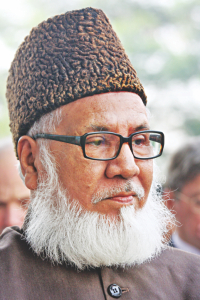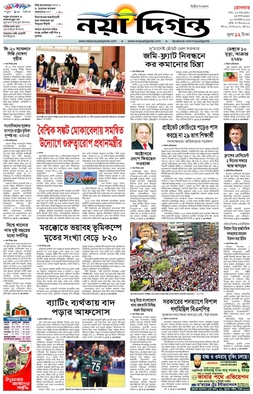
Ghulam Azam was a Bangladeshi Islamist politician. He was the former leader of Bangladesh Jamaat-e-Islami, the largest Islamist political party in Bangladesh.

Motiur Rahman Nizami was a politician, former Minister of Bangladesh, Islamic scholar, writer, and the former leader of the Bangladesh Jamaat-e-Islami. He is noted for leading the terror squad Al-Badr during the Bangladesh Liberation War. On 29 October 2014, he was convicted of masterminding the Demra massacre by the International Crimes Tribunal of Bangladesh. Nizami was the Member of Parliament for the Pabna-1 constituency from 1991 to 1996 and again from 2001 to 2006. He also served as the Bangladeshi Minister of Agriculture and Minister of Industry.
The Al-Badr was a paramilitary force composed mainly of Bihari Muslims which operated in East Pakistan against the Bengali nationalist movement during the Bangladesh Liberation War, under the patronage of the Pakistani government.

Ali Ahsan Mohammad Mojaheed was a Bangladeshi politician who served as a Member of Parliament and as the Minister of Social Welfare from 2001 to 2007. He was executed in 2015 for war crimes committed during the 1971 Liberation war of Bangladesh.

The Daily Naya Diganta is a Bengali daily newspaper published in Bangladesh since 2004.

Bangladesh Jamaat-e-Islami, previously known as Jamaat-e-Islami Bangladesh, or Jamaat for short, is the largest Islamist political party in Bangladesh. On 1 August 2013, the Bangladesh Supreme Court cancelled the registration of the Jamaat-e-Islami, ruling that the party is unfit to contest national elections.
Abdul Mannan was a Bangladeshi religious leader and journalist who served as the minister for religious affairs in the cabinet of Hussain Muhammad Ershad. He was a key collaborator of the Pakistani Army and was accused of war crimes during the Liberation war of Bangladesh.

Salahuddin Quader Chowdhury was a Bangladeshi politician, minister and six-term member of Jatiya Sangsad and member of the Bangladesh Nationalist Party (BNP) Standing Committee, who served as the adviser of parliamentary affairs to Prime Minister Khaleda Zia in from 2001 to 2006. On 1 October 2013 he was convicted of 9 of 23 charges and sentenced to death by the International Crimes Tribunal of Bangladesh for crimes during the 1971 Bangladesh War of Independence. However, limitations placed on his defense testimony were called "disturbing" and the trial called politically motivated.

The International Crimes Tribunal (Bangladesh) (ICT of Bangladesh) is a domestic war crimes tribunal in Bangladesh set up in 2009 to investigate and prosecute suspects for the genocide committed in 1971 by the Pakistan Army and their local collaborators, Razakars, Al-Badr and Al-Shams during the Bangladesh Liberation War. During the 2008 general election, the Awami League (AL) pledged to try war criminals. The government set up the tribunal after the Awami League won the general election in December 2008 with a more than two-thirds majority in parliament.

The International Crimes Tribunal (ICT) is an ongoing tribunal in Bangladesh that aims to investigate and administer justice regarding the war crimes, crimes against humanity, genocide and crimes against peace committed by Pakistan army and their local collaborators Razakar, Al-Badr, Al-Shams during the Bangladesh Liberation War of 1971. In 2008's public election, one of the principal electoral manifestos of the Awami League was to initiate the trial process of war criminals. As promised, a member of parliament from Awami League submitted the proposal of the trial of war criminals on 29 January 2009 in National Parliament and the proposal was accepted unanimously. Finally after 39 years of Liberation of Bangladesh, on 25 March, the tribunal, attorney panel and investigation organization was formed for the trial of the ones accused of war crimes.

On 5 February 2013, protests ignited in Shahbagh, Bangladesh, fueled by the call for the execution of the convicted war criminal Abdul Quader Mollah. Previously sentenced to life imprisonment, Mollah was convicted on five of six counts of war crimes by the International Crimes Tribunal of Bangladesh. Mollah supported the West Pakistan during the 1971 Bangladesh Liberation War and played a crucial role in the murder of numerous Bengali nationalists and intellectuals. The demonstrations also sought the government's ban on the radical right-wing and conservative-Islamist group, Jamaat-e-Islami from participating in politics, including elections, and a boycott of institutions supporting or affiliated with the group.
The 2012 ICT Skype controversy was the leaking of Skype conversations and emails between Mohammed Nizamul Huq, head judge and chairman of Bangladesh's International Crimes Tribunal, and Ahmed Ziauddin, a Bangladeshi lawyer based in Brussels. These conversations took place during the prosecution of the accused for alleged war crimes during the Bangladesh Liberation War in 1971.

The movement demanding trial of war criminals is a protest movement in Bangladesh, from 1972 to present demanding trial of the perpetrators of 1971 Bangladesh genocide during the Bangladesh Liberation War from Pakistan.

Mir Quasem Ali was a Bangladeshi businessman, philanthropist and politician. He was a former director of Islami Bank, and chairman of the Diganta Media Corporation, which owns Diganta TV. He founded the Ibn Sina Trust and was a key figure in the establishment of the NGO Rabita al-Alam al-Islami. He was considered to be the wealthiest member of the Bangladeshi political party Jamaat-e-Islami. He was sentenced to death on 2 November 2014 for crimes against humanity committed during the Liberation War of Bangladesh in 1971 by International Crimes Tribunal of Bangladesh. The charges were denied by his relatives, stating they were politically motivated. Rights groups also raised concerns about these cases, with Amnesty International criticising the use of the death penalty and saying Mir Quasem Ali's trial had been unfair. He was hanged at Gazipur on 3 September 2016 after his final appeal was rejected by the Supreme Court of Bangladesh.

Enforced disappearances in Bangladesh are cases in which the Government of Bangladesh directly or indirectly kidnaps people and holds them incommunicado. According to a Dhaka-based human rights group Odhikar, at least 402 people have become victim of enforced disappearance from 2009 to 2017 under the current Awami League administration. These incidents along with extrajudicial killings in Bangladesh has been criticized by The United Nations and human rights groups including Human Rights Watch and Amnesty International. Rapid Action Battalion (RAB), a special paramilitary unit in Bangladesh, is alleged to be behind most of these disappearances even though RAB claimed these allegations to be false. The current Awami League government denies involvement in these forced disappearances even when victims later surface in custody.
Mir Ahmad Bin Quasem Arman, also known as Mir Ahmad, is a Bangladeshi born British-trained barrister and human rights activist. He is a victim of enforced disappearance and is believed to have been abducted by security forces of the government of Bangladesh. He is the son of late Mir Quasem Ali, a prominent leader of the opposition Bangladesh Jamaat-e-Islami, and was a member of his father's legal defence team before his abduction.
Netra News is a Sweden-based investigative and public interest journalism platform focusing on Bangladesh. The platform was launched on Dec. 26, 2019, by Tasneem Khalil, an exiled Bangladeshi journalist currently living in Sweden, who acts as its editor-in chief.
Md. Miftah Uddin Choudhury is a judge on the High Court Division of Bangladesh Supreme Court.
Aynaghar or House of Mirror is the name of a secret detention centre run by the Directorate General of Forces Intelligence (DGFI), Bangladesh's defence forces' intelligence branch.









